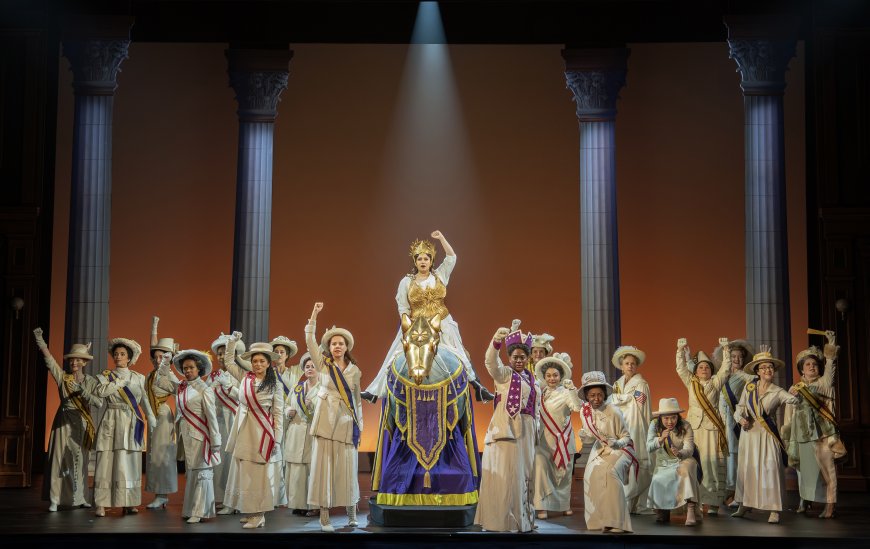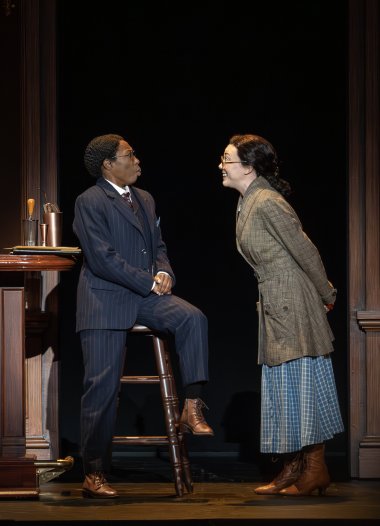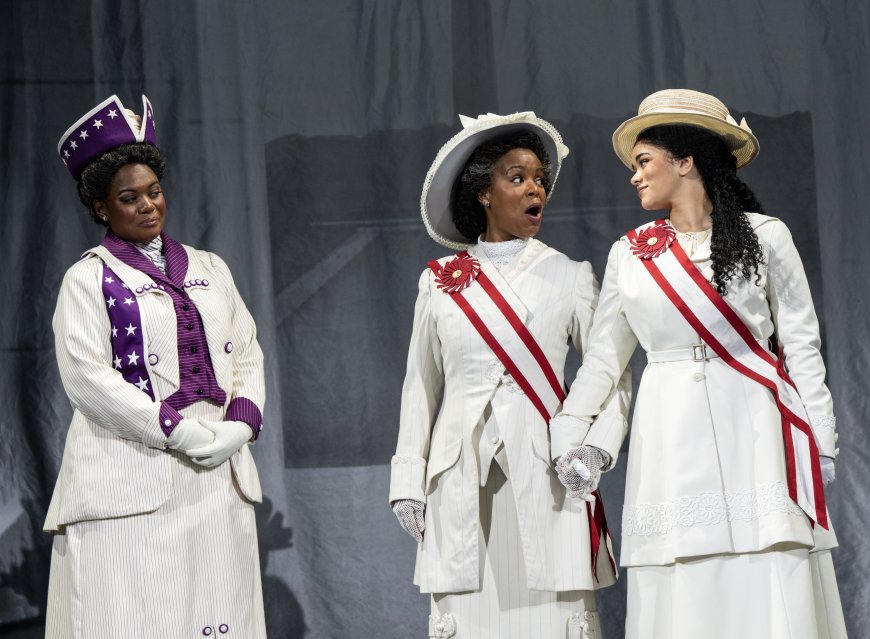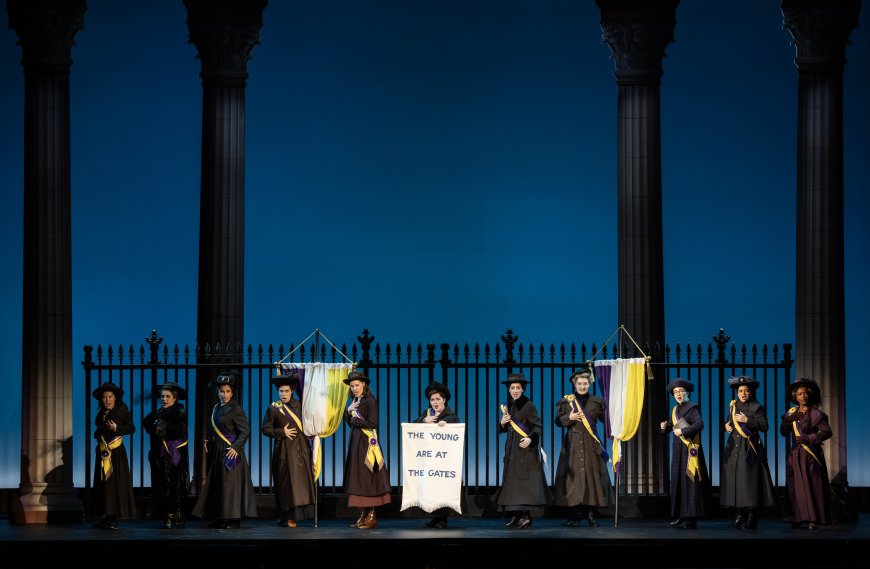
Today, it's easy to "doomscroll" on social media and find alt-right influencers advocating to repeal the 19th amendment. Although I worried Suffs — the Tony Award-winning musical about the suffragists — would extrapolate my fears of cultural regression, it is not a cautionary tale. Rather, it functions as a roadmap for how to achieve incremental change. Perhaps the show derives some of its timeless wisdom from the fact that our pathways to change are, relatively speaking, unchanging.
Suffs, which landed at the Orpheum Theater on Oct. 22 and opens in Los Angeles at the Hollywood Pantages Theater on Nov. 18, delineates the women’s suffrage movement during the decade prior to the 19th amendment’s ratification in 1920. Aside from a caricatured President Wilson and his right-hand man (both portrayed by women), all the characters are female.
The central conflict of the story is not between the suffragists and their political adversaries, but rather between warring factions within the suffrage movement itself. Many women hold diverging opinions on how best to achieve their goal, which offers a more-nuanced schism for Shaina Taub’s book and score to elucidate on.

The show opens with Carrie Chapman Catt, portrayed by the multilayered Marya Grandy, touting a Republican Motherhood-inspired agenda. “Let Mother Vote” she sings in a cutesy (but clearly regressive) style, believing her conservative messaging and appeals to men’s protective instincts will be effective persuasion techniques. However, when Alice Paul enters the scene in 1913, the young disrupter threatens the kindly image of women’s suffrage Carrie has worked her whole life to curate.
Ultimately, Suffs argues that one approach does not harm the other, but rather that they both must work in tandem (or perhaps, in parallel) to create positive change. The old and young guard, or as Carrie sings with reverence, the “rebel daughter” and “careful mother,” must learn from each other.
In contrast to the conventional musical theater repertoire that so often highlights a single female protagonist dreaming of romance, Suffs shows 10 fully embodied, courageous women, in conflict over politics and approaches to activism. Somewhat miraculously, you never lose track of any of their unique storylines.

Taub’s music and lyrics employ a variety of genres that comment on ideological distinctions. For the old guard, the music leans into classic musical theater charm and goof (encapsulated by President Wilson’s satirical take on the “Ladies”), but as the younger voices break tradition, the music becomes much more contemporary, driving, and earnest.
As Alice, Maya Keleher conveys her character’s determination, insistence, and scrappiness with sweeping gestures and emphatic vocals. The slight grit behind her soaring belt enhances her believability in the role.
A dramatic standout is “Finish the Fight,” in which Alice begins to carve her own path as a suffragist. When the curtain opens to reveal a line of silhouetted women moving through aspirational poses, we get our first taste of the musical’s simple yet striking sense of solidarity, as guided by Leigh Silverman’s superb direction.
When Alice gathers her own cohort and speaks in time with underlaid music, you may worry the show will be a knock-off Hamilton. But by the time the anthemic “The March” arrives — featuring women asserting their demands for liberty and an amazonian Inez Milholland on horseback (powerfully portrayed by Monica Tulia Ramirez) — Suffs claims its spot in the musical theater canon. It is a jewel in its own right.

One of its best songs is “If We Were Married,” in which the lovably nerdy Doris Stevens outlines all of the ways women are rendered effectively dead in the eyes of the law once married to a man (which evoked mid-song applause). There are also many moments of humor, notably in “Great American B*tch.”
Tonally, the women’s voices deviate from the expected pingy belt and shimmery soprano musical theater audiences have come to expect. Danyel Fulton’s warmth and richness as Ida B. Wells, Gwynn Wood’s Disney princess-like sweetness as Lucy Burns, Grandy’s brassiness as Carrie, among others, functions to create a colorful spectrum of stylings that uplift the shows message of achieving progress by embracing differing perspectives, but also staying true to yourself.
Suffs doesn’t hide from the racism of the movement, but could have pushed a bit further into the issue.
Susan B. Anthony and Elizabeth Cady Stanton, who argued that white women were more deserving of the vote than Black men, are not portrayed. Rather, Alice tells Ida B. Wells to march at the back of her parade in order to appease the southern women. Though Ida powerfully sings “I will not wait my turn,” we never learn where she actually stood in the march. In this sense, the Black women’s scenes felt largely separate from the white women’s movement and their inclusion in the musical feels like a bit of an afterthought.
But the moments of solidarity we see between three generations of Black women are worth it. Their prevailing dynamic is one of shared intergenerational wisdom, keeping joy through adversity, and taking your people with you. “And so, lifting as we climb, onward and upward we go” becomes their electrifying adage in three-part harmony that rises sonically, and brilliantly lands a half step above what you would expect. These lyrics were originally written by civil rights advocate Mary Church Terrell, played here with grounded optimism by Trisha Jeffrey.

Perhaps the most resonant musical moment was the show’s expectation-defying climax. Rather than a cacophonous peak, the apex of the show is voiced by a quaint, small town farm wife who writes a letter to her son in congress, imploring him to ratify the 19th amendment. The energetic stillness Laura Struck brought to her portrayal served to empower this underdog, and centuries of women who have been systemically oppressed.
Even if the suffragists didn’t believe themselves to be “working together on the same team” most of the time, the audience can see that everyone’s contributions — the radical galvanizers and the moderate appealers — are essential to the amendment’s ratification. And although the show urges us to learn from our history, it also acknowledges that young naiveté can be an essential component of the change making process — as is most keenly evidenced when the audience is catapulted to the 1970’s at the end of the show, and the cycle begins to repeat itself as a young woman of color challenges Alice’s now antiquated views.
Although fully rooted in its own historical timeline, the show almost begs you to apply a presentist lens to it. As the women onstage unite to fight for their rights, express blood-curdling rage at their brutal imprisonment, and insist that you “show them who you are,” you can’t help but think of our current political moment — and feel grateful that the women onstage are unabashedly expressing their outrage, and the people next to you in the audience are also choosing to remain hopeful.

Our biggest takeaway from Suffs must be the women’s persistence. You ache for the suffs as they attempt to access Wilson over a span of three years, who repeatedly blows them off by bellowing “tariff reform!” Although we know the women’s efforts are leading toward hard-earned success, one can imagine how disheartened they must have often felt — just as we feel now.
Suffs is a highly motivating musical, with beautifully varied music and anthemic earworms that will stick with you long after you leave the theater. Although some of the show’s messaging is heavy handed, the directness is refreshing.
The hopeful message of the show is clear. Although the fight for equitable freedoms will never reach a conclusion, we must keep pushing on, lest we lose the gains our predecessors so often risked their lives to achieve.



